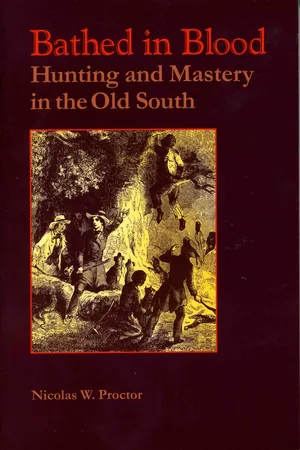
- 220 pages
- English
- ePUB (mobile friendly)
- Available on iOS & Android
About this book
The hunt, like the church, courthouse, and family, played an integral role in southern society and culture during the antebellum era. Regardless of color or class, southern men hunted. Although hunters always recognized the tangible gains of their mission—meat, hides, furs—they also used the hunt to communicate ideas of gender, race, class, masculinity, and community. Hunting was very much a social activity, and for many white hunters it became a drama in which they could display their capacity for mastery over women, blacks, the natural world, and their own passions.
Nicolas Proctor argues in Bathed in Blood that because slaves frequently accompanied white hunters into the field, whites often believed that hunting was a particularly effective venue for the demonstration of white supremacy. Slaves interpreted such interactions quite differently: they remained focused on the products of the hunt and considered the labor performed at the behest of their owners as an opportunity to improve their own condition. Whether acquired as a reward from a white hunter or as a result of their own independent—often illicit—efforts, game provided them with an important supplementary food source, an item for trade, and a measure of autonomy. By sharing their valuable resources with other slaves, slave hunters also strengthened the bonds within their own community. In a society predicated upon the constant degradation of African Americans, such simple acts of generosity became symbolic of resistance and had a cohesive effect on slave families.
Proctor forges a new understanding of the significance of hunting in the antebellum South through his analyses of a wealth of magazine articles and private papers, diaries, and correspondence.
Frequently asked questions
- Essential is ideal for learners and professionals who enjoy exploring a wide range of subjects. Access the Essential Library with 800,000+ trusted titles and best-sellers across business, personal growth, and the humanities. Includes unlimited reading time and Standard Read Aloud voice.
- Complete: Perfect for advanced learners and researchers needing full, unrestricted access. Unlock 1.4M+ books across hundreds of subjects, including academic and specialized titles. The Complete Plan also includes advanced features like Premium Read Aloud and Research Assistant.
Please note we cannot support devices running on iOS 13 and Android 7 or earlier. Learn more about using the app.
Information
Table of contents
- Cover Page
- Title Page
- Copyright Page
- Dedication Page
- Contents
- List of Illustrations
- Acknowledgments
- Introduction
- 1. Game, Landscape, and the Law
- 2. Hunters at Home and in the Field
- 3. Hunting and the Masculine Ideal
- 4. Finding Peers: The Criteria of Exclusion
- 5. The Community of the Hunt
- 6. Slavery, Paternalism, and the Hunt
- 7. Slave Perceptions of the Hunt
- Epilogue
- Notes
- Selected Bibliography
- Index